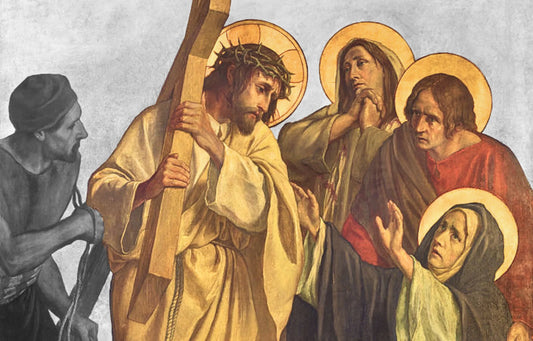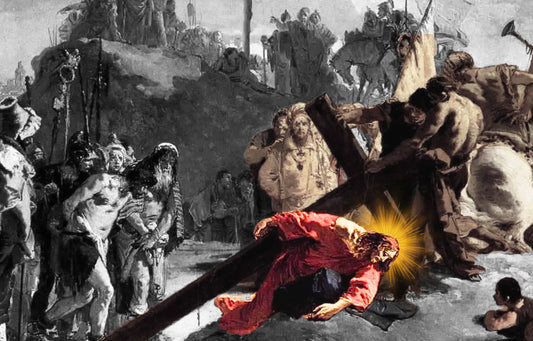Wearing a cross necklace is not a sin according to the Bible or mainstream Christian doctrine. In fact, it is widely accepted across denominations—including Catholic, Protestant, and Orthodox traditions—as a symbol of faith, remembrance of Christ’s sacrifice, and public identification with Christianity.
The cross has been used as a Christian symbol since at least the 4th century, with historical roots in both Scripture (1 Corinthians 1:18) and early Church tradition. Some groups, like certain branches of Puritanism or Jehovah’s Witnesses, avoid religious symbols, but these are exceptions, not the norm.

Key Takeaways
- Symbolism Matters: The cross necklace symbolizes faith and serves as a reminder of Christian beliefs.
- Biblical Foundation: The Bible references the significance of the cross in Christianity, emphasizing its role in redemption and salvation.
- Personal Significance: Wearing a cross necklace can deepen one's spiritual connection and serve as a personal expression of faith.
- Respect Diverse Views: Acknowledge and respect that individuals may interpret the symbolism of the cross differently based on their beliefs and experiences.
- Reflect on Meaning: Take time to reflect on the meaning behind wearing a cross necklace and how it aligns with your faith journey.
- Stay Open-Minded: Embrace different perspectives on the symbolism of the cross necklace, fostering understanding and unity within the Christian community.
Understanding the Symbolism

Historical Context
The cross, a quintessential symbol of Christianity, traces its origins to early Christianity. Initially, it symbolized Jesus' crucifixion and sacrifice. Over time, it evolved into a prominent emblem of faith for believers. Significant historical events, such as the Roman Emperor Constantine's adoption of Christianity in the 4th century, further solidified the cross's significance.
Modern Interpretations
Contemporary Christians often view the cross necklace as a personal expression of their faith and devotion. Fashion trends have played a role in making cross necklaces popular accessories today. While traditional views emphasized religious symbolism, modern interpretations may focus more on style and personal meaning.
Personal Significance
For individual believers, wearing a cross necklace carries unique personal significance. It symbolizes their connection to their faith and serves as a constant reminder of their beliefs. Personal experiences, such as overcoming challenges or finding solace in times of need, often influence one's decision to wear a cross necklace. Many individuals share stories of how their cross jewelry brings them comfort, strength, and a sense of spiritual connection.
Exploring Biblical References

Old Testament Mentions
The Old Testament subtly foreshadows the cross symbol through various prophecies and events, such as the binding of Isaac by Abraham. Sacrificial themes in the Old Testament, like the Passover lamb's blood on doorposts, echo the concept of sacrifice and atonement later embodied by the cross. By establishing a foundation of sacrifice and redemption, the Old Testament sets the stage for understanding the New Testament's message about the cross.
Cross as a Symbol
The cross stands as a universal symbol of Christianity, representing Christ's ultimate sacrifice and victory over sin. Artistic representations, such as the Latin cross and Greek cross, carry diverse meanings but all point to themes of faith, love, and eternal life. For believers, the cross embodies hope, redemption, and the promise of a resurrected life in Christ.
New Testament Refrences
Galatians 6:14
"But far be it from me to boast except in the cross of our Lord Jesus Christ, by which the world has been crucified to me, and I to the world."
This verse emphasizes the central importance of the cross in Christian faith, suggesting why some might choose to wear it as a symbol.
1 Corinthians 1:18
"For the message of the cross is foolishness to those who are perishing, but to us who are being saved it is the power of God."
Here, Paul highlights the cross as a powerful symbol of salvation, which could inspire believers to wear it as a reminder.
Matthew 16:24
"Then Jesus told his disciples, 'If anyone would come after me, let him deny himself and take up his cross and follow me.'"
While not about wearing a cross, this verse speaks to the idea of bearing one's cross, which some interpret as wearing a cross necklace.
1 Peter 3:3-4
"Your beauty should not come from outward adornment, such as elaborate hairstyles and the wearing of gold jewelry or fine clothes. Rather, it should be that of your inner self, the unfading beauty of a gentle and quiet spirit, which is of great worth in God's sight."
This passage encourages focusing on inner spiritual beauty rather than outward adornment, which some apply to the practice of wearing religious symbols.
Colossians 2:16-17
"Therefore do not let anyone judge you by what you eat or drink, or with regard to a religious festival, a New Moon celebration or a Sabbath day. These are a shadow of the things that were to come; the reality, however, is found in Christ."
While not specifically about crosses, this verse suggests that external religious practices (which could include wearing symbols) are less important than one's relationship with Christ.
Personal Reflection and Spiritual Connection

Individual Faith Journey
Embarking on an individual faith journey, wearing a cross necklace signifies personal beliefs and values. Personal struggles and triumphs often mold one's connection with the cross, reflecting inner strength. Each person's unique experiences shape their spiritual expression.
Daily Reminders of Faith
A cross necklace acts as a tangible reminder of one's commitment to faith, offering psychological benefits during challenges. It serves as a symbol of hope and a source of comfort throughout daily life. Believers can use this physical adornment for moments of reflection and prayer.
Expressing Beliefs
Wearing a cross necklace is a powerful way to express one’s beliefs openly. It becomes a conversation starter about faith and spirituality, fostering meaningful dialogues. Visible symbols like the cross promote unity among believers, creating a sense of community.
Respecting Individual Interpretations
Diverse Christian Views
Christianity holds a spectrum of perspectives on wearing a cross necklace, varying among believers. Cultural and denominational influences shape how individuals perceive and practice this tradition. Open communication is vital to understanding diverse interpretations while uniting under a shared faith in Christ.
Cultural Differences
While the cross is widely recognized as a Christian symbol, it's important to be mindful of cultural sensitivities. In some predominantly non-Christian countries, wearing a visible cross might be seen as provocative or disrespectful. For instance, in certain Middle Eastern nations, it's advisable to be discreet about displaying religious symbols. Always research local customs when traveling to avoid unintentional offense.
Theological Implications of Wearing a Cross with Jesus Depicted
The debate over depicting Jesus on the cross touches on deeper theological issues. Some argue that a crucifix (cross with Jesus' body) emphasizes Christ's suffering and sacrifice, making it a powerful reminder of God's love. Others prefer an empty cross, symbolizing the resurrection and victory over death. There's no biblical mandate either way—it's a matter of personal preference and denominational tradition.
Respect and Tolerance
Respecting individual choices regarding religious symbols like the cross necklace is crucial in fostering harmony within diverse communities. Tolerance plays a key role in embracing varying beliefs in a pluralistic society. Encouraging empathy and acceptance toward differing expressions of faith promotes unity and mutual respect.
Summary
Each person's journey with the cross necklace is unique and deserves respect and understanding. While the Bible doesn’t specifically mention cross necklaces, it emphasizes the cross as a representation of Christ’s sacrifice and the hope of salvation. The real significance isn’t in the necklace itself but in what it stands for. As Paul notes in 1 Corinthians, the cross represents the power of God for those who believe.














